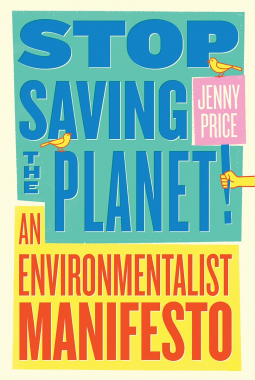You and me and Gwyneth. [Stop Saving the Planet! by Jenny Price]
A few of the environmentalist terms highlighted I'd heard before, but "green virtue," whether I've heard it or not, though I don't think I have, is a perfect encapsulation of consumerist environmentalism. And it's just one facet of the "save the planet" mantra Jenny Price deconstructs in Stop Saving the Planet!
"Pithy, funny, exasperated, and informed…You cannot read a more important hundred pages than Stop Saving the Planet!" —Richard White, author of The Republic for Which It StandsWe’ve been "saving the planet" for decades!… And environmental crises just get worse. All this hybrid driving and LEED building and carbon trading seems to accomplish little to nothing—and low-income communities continue to suffer the worst consequences.
Why aren’t we cleaning up the toxic messes and rolling back climate change? And why do so many Americans hate environmentalists?
Jenny Price says, Enough already! with this short, fun, fierce manifesto for an environmentalism that is hugely more effective, a whole lot fairer, and infinitely less righteous. She challenges you, corporate sustainability officers, and the EPA to think and act completely anew—and to start right now—to ensure a truly habitable future.
Price asks the reader to imagine a new environmentalism, an earnest, holistic approach where people are our above profit and the imagery of green action doesn’t occlude the zero sum reality. And the first steps to reimagining solutions are identifying the failings of the ones in place. Step-by-step, Price walks through how underlying strategies of capitalism environmentalism serve primarily to maximize profit while routinely disregarding environmental issues. After a discourse on the structural issues of the popular brand of environmentalism and a reimagined definition of "environment" come 39 ways to positively affect those spaces.
Rooted in an equitable and holistic approach to environmental protection, the book was a practice in questioning the status quo. A few ideas I'd been familiar with, like reshifting the onus from a personal, individual consumer culpability back to the corporate entities who are at the root cause. And other information I'd been generally aware of was explained and recontextualized. Say, carbon markets. I enjoyed this read and found little that I didn't agree with or find logical in its conclusion. Some of cited examples or suggestions for further reading I raised eyebrows at, but the eyebrow raising was not enough to negatively affect my reading experience. The prompt space for brainstorming was addition, transforming the book from researched manifesto to personal or communal tool. 5 stars from me.
Stop Saving the Planet! (ISBN:9780393540871) is due for publication April 20, 2021.

Comments
Post a Comment